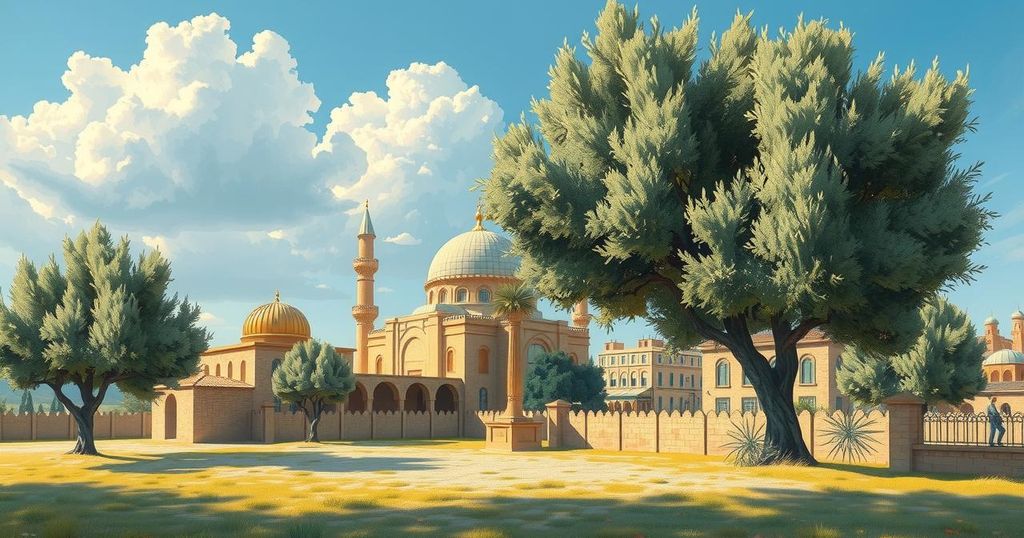The Weiser Diplomacy Center hosted a talk on the reconstruction of Syria featuring Qutaiba Idlbi and Dr. Abdalmajid Katranji. Discussion points included the effects of 14 years of civil war, the establishment of civic institutions, and the role of U.S. involvement in Syria’s reconstruction. The speakers called for the relaxation of sanctions and emphasized the importance of on-the-ground perspectives in understanding Syria’s current situation.
The University of Michigan’s Weiser Diplomacy Center recently hosted a discussion featuring Qutaiba Idlbi from the Atlantic Council and Dr. Abdalmajid Katranji, focused on the reconstruction challenges in Syria following the civil war. They addressed the destruction from the 14 years of conflict, state-building efforts by the new government, and ongoing obstacles to recovery in the war-torn nation.
Following the collapse of Bashar al-Assad’s regime on December 8, 2024, Ahmed al-Sharaa, head of Hay’at Tahrir al-Sham, took over leadership in Syria. This transition has raised concerns among some Western observers regarding al-Sharaa’s alleged ties to Al-Qaeda, which Idlbi and Katranji countered by clarifying that he has distanced himself from the organization and has been combating extremist groups like ISIS.
Idlbi highlighted the extensive emigration caused by the conflict, describing it as an unparalleled brain drain since World War II. He articulated the mixed emotional landscape among Syrians, noting their relief at escaping oppressive rule while grappling with pervasive economic hardship. “There’s a lot for Syrians to rebuild; half of Syria has left the country,” he stated.
Katranji recounted his humanitarian work in Idlib, emphasizing the establishment of civic institutions that support reconstruction, such as the White Helmets. He remarked, “There was structure, there were institutions, and that’s what’s critical to understand,” pointing out a marked difference between governance in Idlib compared to the regime-controlled areas.
In contrast, Katranji described the chaos within Assad’s territory, where bureaucratic obstacles hampered humanitarian efforts. He explained that rescuers faced brick walls of authority that stifled swift action, revealing significant governance deficiencies: “There was no structure, and we were still rescuing people…because there was no civil brigade.”
Idlbi proposed that despite the war’s devastation, it allowed Syrians to engage in the formation of self-governing institutions, unlike the U.S. experience in Iraq. He emphasized the importance of organic governance development in Syria: “They already started nation building, we’re not coming in to set up systems.”
While acknowledging previous U.S. missteps, Idlbi asserted the importance of American involvement in Syria’s reconstruction, affirming that support should not undermine the autonomy of Syrians: “Do they need our support? Absolutely… they have built the Syrian Dream, which I believe is very similar to the American Dream.”
Katranji also critiqued U.S. sanctions against Syria, citing them as a hindrance to recovery efforts. He argued for their prompt repeal, pointing out that international consensus is leaning towards easing restrictions as well: “If you wait too long, then another vacuum will be created, somebody else will step in.”
The discourse concluded with insights from Razaan Killawi, a Michigan Art & Design senior and co-president of Students Organize for Syria. She stressed the significance of student engagement with Syria-related events and emphasized the need for credible, on-the-ground journalism to combat misinformation: “I think it’s really meaningful when students can come to events led by Syrians… to learn from them and see what is actually happening.”
The discussion at the Weiser Diplomacy Center underscored the complexities of Syria’s post-civil war reconstruction. Key points included the need for civic engagement and institution-building in a society previously stifled under Assad’s regime, the importance of U.S. involvement in reconstruction, and the urgent call to revise sanctions that impede recovery efforts. Both Idlbi and Katranji advocated for a nuanced understanding of Syria’s current governance and the necessity for informed civic engagement going forward.
Original Source: www.michigandaily.com






